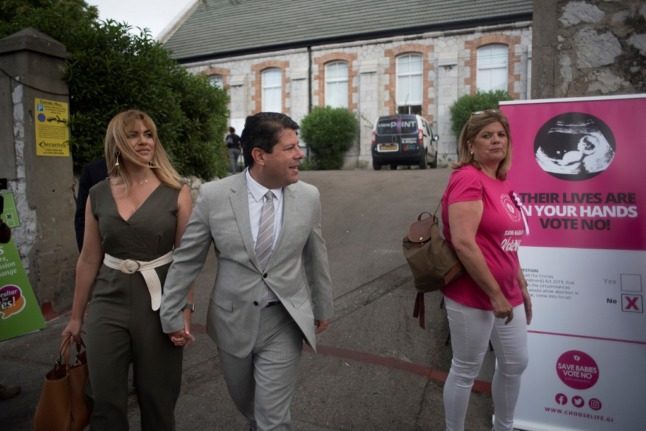GIBRALTAR
‘Let’s see how it goes’: Gibraltarians wary but relieved after deal
Gibraltarians reacted with relief and caution Friday after Madrid and London reached a deal allowing the territory to become part of Europe's passport-free zone to keep movement fluid on its border with Spain.
Published: 2 January 2021 12:04 CET

Cyclists cross the border from Spain into Gibraltar. Photo: Jorge Guerrero/AFP
Some 15,000 people, mainly Spanish, pour into Gibraltar, a tiny British territory on the southern tip of the Iberian peninsula, from Spain every day to work, accounting for half of its workforce.
Thousands more tourists go through the single checkpoint on the frontier every day, mostly day-trippers from Spain drawn in part by Gibraltar's duty-free shopping.
With a land area of just 6.8 square kilometres (2.6 square miles), Gibraltar must import all of its food. Some 50,000 trucks cross the border every year on the only road linking the territory to Spain.
Without a deal, this flow would have been slowed by tighter checks and more passport stamping once Britain's Brexit transition period ended on December 31, creating a new “hard border” between Gibraltar and the European Union.
The frontier was virtually deserted Friday due to the New Year's Day holiday and pandemic restrictions on the entry of tourists.
“It's good news, it seems like the best way to keep everything moving,” said Oliver Gomez, a 34-year-old actuary, as he walked his dog in Gibraltar's mostly empty marina when asked about the deal.
Under terms of the last-minute accord announced Thursday by Gibraltar and Spain, the tiny territory would become part of the Schengen passport-free zone, which covers 26 European countries (most of the 27 EU members, along with Norway, Iceland, Switzerland and Lichtenstein).
Spain would be responsible for managing the Schengen arrangement which would be implemented by Frontex, the agency charged with protecting the EU's external borders.
All the details of the agreement will be settled between Spain and Britain during a six-month transition period.
Border frictions
Some Gibraltarians, however, expressed concern over Spain being given a role in managing the deal.
“We haven't always had the best track record with the Spanish. Let's see how it goes,” said Jeff Saez, a 43-year-old hotel employee while out on a morning bike ride along the marina.
While Spain ceded Gibraltar to Britain in perpetuity in 1713 following a military struggle, Madrid has long wanted it back in a thorny dispute that has for decades caused friction on the frontier.
Tensions peaked in 1969 when the regime of dictator Francisco Franco closed the border, which did not fully reopen until 1985.
In 2013, Spain stepped up its vehicle checks at the border and mulled imposing a crossing fee, triggering months of gridlock amid a dispute over an artificial reef.
Mark Leavesley, a 34-year-old Gibraltar real estate agent, said he believed the territory would adapt well whether there was a border deal or not.
“Gibraltar has proven to be resilient,” he said.
'Nimble economy'
Gibraltar was forced to reinvent its economy after Britain sharply reduced its military presence in the territory in the 1980s, including closing its naval dockyards, a major employer.
Britain's military now accounts for less than ten percent of Gibraltar's GDP, compared to 60 percent in the late 1970s, according to John Fletcher, an economist at Britain's Bournemouth University.
The territory used favourable tax policies to help build up its banking and financial services sectors, which have transformed it into one of the most prosperous regions in Europe.
“It is a really nimble and inventive economy and it can be that way because it is so small it can change quickly,” Fletcher told AFP, describing Gibraltar's economic transformation as “amazing”.
There was relief as well in La Linea, the impoverished Spanish city just across the border from Gibraltar which has long relied on the territory for jobs and business.
Nuria Hernanez, who owns a hardware store in La Linea, estimates that 40 percent of the customers come from Gibraltar.
“Without them there would be nothing here,” she said.
Url copied to clipboard!



 Please whitelist us to continue reading.
Please whitelist us to continue reading.
Member comments